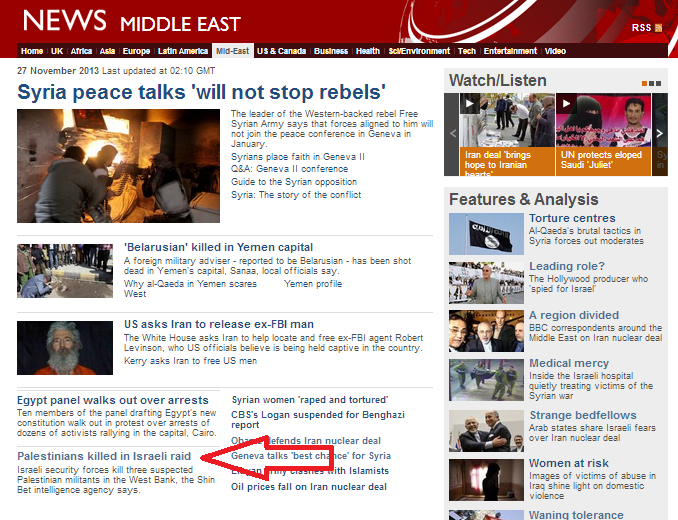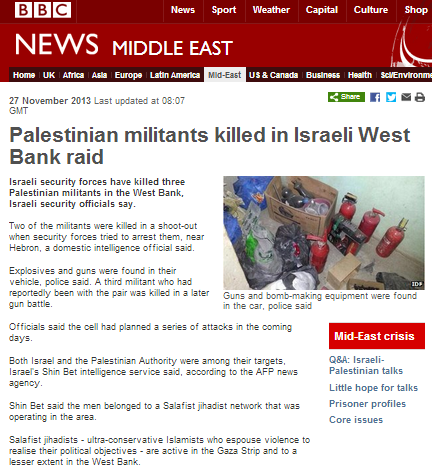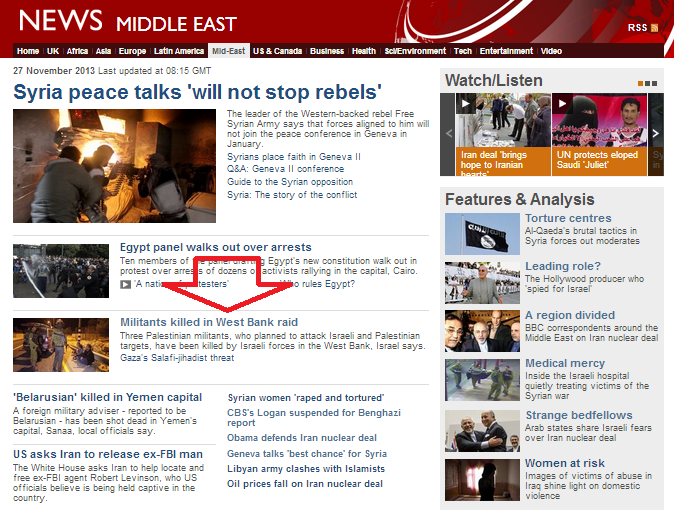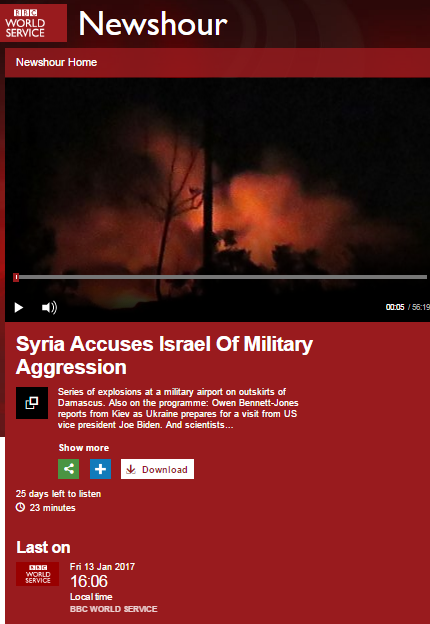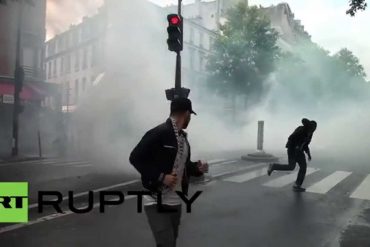A headline appearing on the Middle East page of the BBC News website on the evening of November 26th informed readers of “Palestinians killed in Israeli raid”.
The link leads to a short article titled “Suspected Palestinian militants killed in Israeli raid“, the second version of which is shown below.
That 121 word article contained very sparse information and was amended after its initial publication to include two additional uses of the phrase “suspected militants” in addition to the two already included in its initial version.
The incidents to which the report refers took place on the evening of November 26th in Yatta, south of Hebron. As Israeli security forces operated to arrest members of a Salafist group (in addition to others already arrested earlier) planning to execute terror attacks in the coming days, two members of the group were intercepted whilst travelling in a car. The two initial BBC reports failed to mention that the occupants of the vehicle fired at the security forces when the latter tried to stop them, stating only that:
“Two of the suspected militants were killed in their vehicle near the city of Hebron, Israeli officials said.”
According to more detailed reports:
“The Palestinian terror suspects were in a car that had explosives and firearms in it, when they were met by the counterterrorism unit and additional special forces, who were sent to intercept the vehicle, a senior IDF source said.
Israeli forces opened fire at the car’s wheels, and the suspects fired back. Following an exchange of fire, the two suspects were killed, the source said.”
On the morning of November 27th, the BBC report underwent significant changes and the later version now reflects the fact that an exchange of fire took place.
“Two of the militants were killed in a shoot-out when security forces tried to arrest them, near Hebron, a domestic intelligence official said.”
The link to the article on the Middle East page was also amended to better reflect the actual events:
The original BBC report stated:
“According to security agents, the network was planning attacks on Israel in the coming days.”
It neglected to mention that the cell was also planning attacks against the Palestinian Authority.
“The IDF said the organization to which the two belonged had over the past months attempted to set up an extensive military infrastructure across the West Bank. The organization had planned to target Palestinian Authority structures and personnel, in addition to Israeli soldiers and settlers, the statement said.”
That omission was rectified in the later version of the report:
“Officials said the cell had planned a series of attacks in the coming days.
Both Israel and the Palestinian Authority were among their targets, Israel’s Shin Bet intelligence service said, according to the AFP news agency.”
The first two versions of the BBC report also stated:
“Members of the [Salafi jihadist] movement are thought to operate in both the West Bank and the Gaza Strip.”
In fact, the operation of Salafist groups in both those areas (as well as in the neighbouring Sinai Peninsula and in Syria) is well-known – rather than merely “thought” to exist – with the BBC itself having reported on Salafists in the Gaza Strip and a Hizb ut Tahrir rally (not reported by the BBC) having taken place in Ramallah last July. Amos Harel writes in Ha’aretz:
“The presence of the Salafis, most of whom are not violent, is now being felt in the West Bank, nearly a decade after they established themselves in the Gaza Strip. Last year, saw a rise in their organized operations, most of which are not political and do not involve terror activity. In East Jerusalem, in particular, one stream called Hizb a-Tahrir stands out, though its activities aren’t violent. Still, there have recently been large assemblies of Salafist groups at several locations in the West Bank, including in the Hebron area. “Suddenly, from nowhere, you hear that 30,000 people are attending a gathering at the stadium in the South Hebron Hills,” a senior military official told Haaretz.
[…] On the margins of the Salafist movements, there is a violent jihadist arm under the influence of al-Qaida’s violent ideology, which has already manifested itself in cells in the Gaza Strip. One can assume that the increased activity of factions with similar ideologies, both in the Sinai Peninsula and especially in the murderous Syrian civil war, strengthens support for them in the West Bank.”
Again, the later version of the report corrected that inaccuracy:
“Salafist jihadists – ultra-conservative Islamists who espouse violence to realise their political objectives – are active in the Gaza Strip and to a lesser extent in the West Bank.”
Whilst it is good to see the BBC News website correcting its own mistakes, no notification of the changes made is provided to those visitors to the site who read the earlier – inaccurate – versions of the article during the eleven or so hours that they were left up on the website. Having already read the report, those readers are unlikely to bother revisiting it just to check if the BBC has made any amendments. Once again, this underlines the need for a dedicated page showing corrections and amendments on the BBC News  website.
website.
Also on November 26th, a Palestinian from the Gaza Strip carrying a grenade was apprehended near Kibbutz Kfar ‘Aza after managing to infiltrate the border fence. On the same evening, residents of Ashkelon had to rush to their air-raid shelters as the siren warning of incoming missiles from the Gaza Strip sounded. The missile fell short, landing in the Gaza Strip and endangering the local population there. Neither of those incidents was reported by the BBC.

